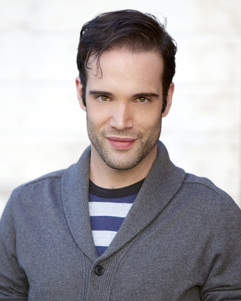
Mothers and Sons is the continuation of a story Terrence McNally first began telling in 1988 with his short play Andre's Mother. In that play, the title character Katharine, confused, angered, and grieving can't even utter a word at her son Andre's memorial in Central Park. Twenty years later, in Mothers and Sons, Katherine shows up at the home of Andre's boyfriend Cal and finds him healthy and successful with a family. From there, she and Cal try to navigate their way through the conversation she couldn't have two decades earlier.
In a lot of ways this is a play about progress; personal, societal, and cultural. Mothers and Sons uniquely captures the essence of a reshaped world from the perspectives of the four different generations, and shows the long struggle that it sometimes takes for certain cultural paradigms to shift.
What role do you play and how does s/he fit into the story?
I play Will Ogden. I'm the younger husband of Cal, who used to date Katharine's son Andre. The play takes place in our apartment. After an afternoon in the park, I return home with our son Bud to find our unexpected house guest.
What are your character’s strengths and weaknesses?
I'm still making discoveries about this, but I do think that Will's strengths are also his biggest weaknesses. He's a great family man—he loves his husband and his son—they're all he's ever wanted. The problem for him is that since he's so good at the domestic side of this relationship he has a hard time turning that off. It's what keeps him from asking unwanted company to leave so he can get on with the family plans they have. His sensitivity is tricky that way—it's what makes him happy, but it's also what makes him hurt.
What do you find challenging about playing your character?
When I first said yes to this part, I thought I was going to have a much harder time with playing Will. I was fascinated by him and I loved his point of view, but there are moments when he handles things very differently from how Justin would. I was afraid I might judge his point of view. Fortunately, I'm working with three great actors and Gregory is a very intuitive and gentle director. They all have my complete trust and I have no problem being vulnerable and exploring. So as we work, I'm finding some of the similar archetypal material underneath the differences between Will and I, that hopefully will bring truth to my actions.
What do you think is challenging/exciting/interesting about Mothers and Sons?
I'm still intrigued by the fact that we're painting such an extensive portrait of the past several decades of gay life in America. I first read Andre's Mother in the late nineties, before Vermont had even passed the Civil Union law. I couldn't have imagined performing it's sequel, as an adult, in an America with federal marriage equality. I am just about the exact age as my character—and have lived through the same years he has, and the play talks about those years extensively. It's very close to my own life in that way. It's the difference between comprehending and knowing. Through research, imagination and sensory exploration, I can comprehend what it would be like to be, Cliff in Cabaret for instance—I can gather the essence of his world. But Will's world I know. Completely. His world is the same as mine, so that's rare and kind of exciting.
What is your favorite line in the play?
This is always a difficult question. There's a powerful speech I give at the end of the play that I personally respond quite strongly to. McNally has given my character some very touching words. If I had to pick one specific line though, it's one of Bud's. He's talking about his extended family, and asks if Katherine wants to be his grandmother. She says that he doesn't know her well enough, and his reply is “I didn't know any of them before either. Family's just grow.” I sort of love that … the idea that family is who you decide to include, not just what you are born into. One of the wisest statements in the play and it comes from the 8 year old.
What do you like about Mothers and Sons?
Mothers and Sons is actually edgier than I originally gave it credit for. I love that. I think in my first few rounds with it, I got a little swept away with its poetry. Here you have this character whose disapproval of her gay son is a huge obstacle—t's been twenty years and she's still struggling with it—and McNally drops her into this epicenter of gay metropolitan domestic bliss. The tension of that premise is tremendous, no matter how polite everyone is. It's quite satisfying for everyone to have the chance to say their piece.



